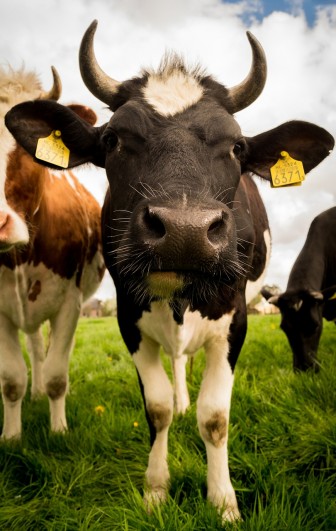
Farmers on large-scale dairy farms dehorn their cattle to prevent injuries to other cows and to the farmer.
By Amanda Proscia
A Minnesota genetics lab is tweaking cow DNA to produce hornless cattle — a development that supporters say could improve cow well-being in the dairy industry.
Recombinetics, a biotech lab in St. Paul, Minn., uses gene editing to modify traditional dairy cattle DNA so that the animals never grow horns.
“Through genetics, you can eliminate the production of horns,” said Mark Walton, chief marketing officer for Recombinetics.
Supporters say that it eliminates the need for painful removal of horns from young calves. But some critics say the technique is just a high-tech way to continue miserable conditions for cows on large-scale farms.
Recombinetics is also developing a process to produce animals of a particular sex, said Walton. That’s of help in the egg industry where hens are valued and male chicks are often killed. It would also reduce the need to castrate pigs in the pork industry and sell male calves as veal in the dairy industry.
Unlike some genetic engineering, Recombinetics’ technique introduces no “foreign” DNA to the cow. Instead, researchers copy the DNA of polled or hornless cattle that resulted from a genetic mutation.
“Our method exactly replicates the DNA of these cattle,” said Walton. “Two to three percent of dairy cattle already carry the same version of that gene.”
Since some cattle already carry the gene, Recombinetics’ process is a kind of accelerated selective breeding technique, he said.
Scientists target a portion of the cow embryo’s DNA, break the strand and insert a template into the broken DNA strand in a sci-fi version of cut and paste. The DNA repairs itself by using the inserted template and generates the strand researchers want, Walton said. After the strand has repaired itself, it will have the exact DNA of polled cattle.
Recombinetics has already produced a number of the gene-edited hornless cattle, Walton said. He declined to reveal how many, the cows’ locations or the cost of the gene-editing technique.
The Food and Drug Administration has yet to rule on gene editing technologies that don’t introduce foreign DNA into an animal species, Walton said. It has recently ruled potatoes and apples modified without foreign genes are “as safe and nutritious as their conventional counterparts.”
Hornless dairy cows would erase the need for farmers to dehorn their cattle — a procedure used to prevent injury to other cows and to farmers, said Jennifer Roberts, a veterinarian specializing in large animals at Michigan State University.
Calves are often dehorned with hot-irons or a chemical paste. In the hot-irons method, the farmer or veterinarian performing the procedure heats the donut-shaped irons and then places them over the horn nubs. The heat cauterizes the horns and prevents further growth.
In the other method, a chemical paste is applied to the horn nubs and causes a chemical burn that destroys horn-producing cells and stunts the horn growth.
Farmers and veterinarians perform the procedure when the calves are still young so their horns are not fully developed. Veterinarians apply a numbing medication to the horns before the horn removal and then give the cows pain management medication once the dehorning is over, Roberts said.
Not everyone is convinced that the technology is a good thing.
“It seems like a way of continuing cruel factory farm operations without changing infrastructure,” said Patrick Kerrigan, retail education coordinator of the Organic Consumers Association — a food safety advocacy group based in Minnesota. “Why not take them out of a factory and into a farm?”
While Kerrigan applauded the genetic engineering industry for considering animal welfare, he said that there are natural alternatives to achieve the same result.
“But you can’t patent natural selection,” said Kerrigan.